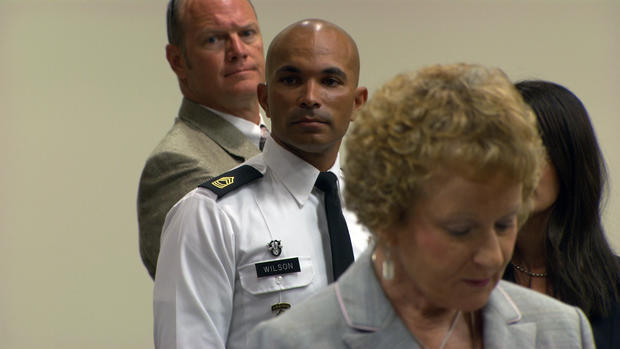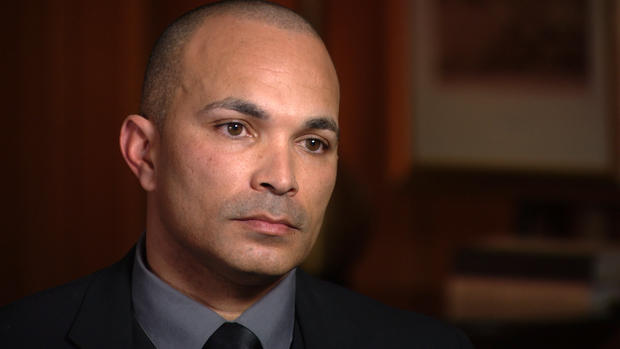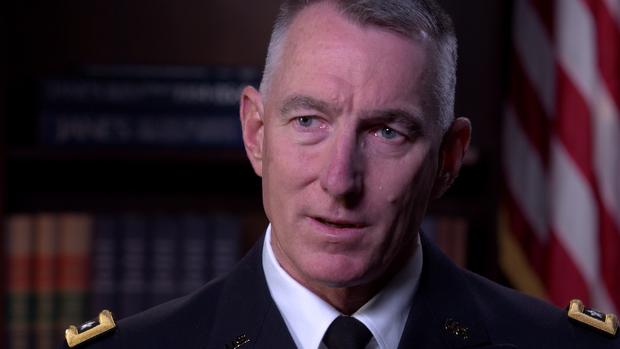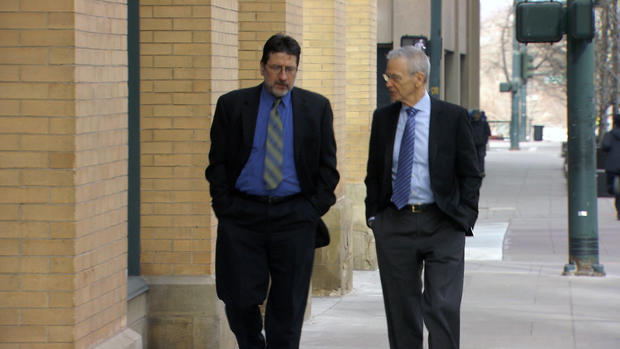Backlash from Army's largest criminal investigation
The following is a script from "After Shock" which aired on May 22, 2016. David Martin is the correspondent. Mary Walsh, producer.
It is the largest criminal investigation in the history of the United States Army -- an after shock caused by the wars in Iraq and Afghanistan. Running short of soldiers, the Army National Guard came up with a scheme called the Recruiting Assistance Program which paid a $2,000 bonus to members of the Guard who brought in a new recruit. A total of 105,000 soldiers got those bonuses, but some of them scammed the system by claiming to bring in recruits they had never met. Eighty soldiers have pleaded guilty or been convicted, and another 60 remain under indictment. By now most of the big fish have been caught, including some who raked in more than $100,000 in fraudulent bonuses. But as the investigation grinds on into its fourth year a backlash has set in. Some soldiers claim they did nothing illegal and are being made scapegoats for a recruiting program the Army admits was badly mismanaged from the start.
Master Sergeant Jerry Wilson is one of the 105,000 soldiers who fell under investigation. Last year, he walked into Adams County Courthouse in Colorado charged with felony theft for the bonuses he received from the recruiting assistance program.
David Martin: How many potential soldiers did you end up recruiting?
Jerry Wilson: Twenty-two.
David Martin: And how much did you make for those 22 soldiers?
Jerry Wilson: $43,000.
David Martin: $43,000.
Jerry Wilson: Yes.
A combat veteran and recipient of the Bronze Star, Wilson had been in the Army for 21 years, most of it as a Green Beret.
Judge: We will call 14-CR-327 People v Wilson.
Now he was facing four to 12 years in prison after the Army's Criminal Investigation Division concluded he was "not entitled to any" of the bonus money he received for soldiers who joined the Colorado National Guard.
David Martin: We've talked to your lawyer and she said it looked like a strong case. When she first saw it she was worried.
Jerry Wilson: OK.
David Martin: Were you?
Jerry Wilson: No, 'cause I thought I was innocent. I mean why would I go to court and put myself through everything I put myself through if I didn't think I was innocent.
Prosecutor Ted D'Arcy told the court Wilson came up with dates of birth and Social Security numbers of young men already on track to join the Guard and entered the information into a website without their permission -- then collected a $2,000 bonus.
"We had a program with the best of intentions, but unfortunately it was poorly designed. We left ourselves vulnerable to fraud."
Ted D'Arcy: This was a program that was so easy to abuse.
Gary Cheek: We had a program with the best of intentions, but unfortunately it was poorly designed. We left ourselves vulnerable to fraud.
According to Lt. Gen. Gary Cheek, director of the Army Staff, the National Guard created the program in 2005. Between Iraq and Afghanistan the Guard had more troops deployed than at any time since World War II - and fewer recruits coming in.
Gary Cheek: When you zero in on the time that this program was initiated in 2005 the Army was under a lot of stress. We were fighting in two wars. The National Guard was 20,000 soldiers under strength and attempting to grow.
David Martin: So, what's the practical impact of having the National Guard be short 20,000 soldiers?
Gary Cheek: They will end up having a unit that's under strength to go to combat.
The Recruiting Assistance Program was considered, in the words of this National Guard publication, "...one of the most successful recruiting and retention programs launched in recent history..." so successful it was adopted by the rest of the Army.
Gary Cheek: The only metric we were tracking was success. How many soldiers are we recruiting? This is a big mistake in running a program like this.
David Martin: So the numbers were going up?
Gary Cheek: The numbers were going up.
David Martin: How long did it take the Guard to get back to the strength it was supposed to be at?
Gary Cheek: So it took about three years for them to meet their recruiting objectives.
David Martin: So, if the problem's pretty much solved by 2008, why does this bonus program keep running until 2012?
Gary Cheek: I think that's a great question.
David Martin: And the answer is?
Gary Cheek: And the answer is they probably should've reviewed it and considered, terminating it.
By the end of 2010, Army investigators had uncovered 19 criminal cases, including a ring of seven soldiers in Texas led by Specialist Xavier Aves who admitted "he and his co-conspirators unlawfully obtained a total of at least $244,000 in fraudulent recruiting referral bonus payments...." The Army was beginning to suspect the program had "systematic failures" but that didn't stop the National Guard from exhorting soldiers like Jim Root to take part.
Jim Root: When I enlisted, they were promoting this like no tomorrow, wanting everybody to participate in this program. And there was never once a conversation about, "this program is under investigation for fraud. You should stay away from this program."
Four years later, Root was indicted for "unlawfully, feloniously and knowingly" claiming recruiting bonuses he did not deserve. He insisted he was innocent.
David Martin: Did they offer you any plea deal?
Jim Root: Initially they offered me to drop the charges if I paid back $18,000. I know as it got closer, I think they wanted $6,000 or $9,000 and they would drop charges.
David Martin: But that must have been a tempting deal. You can get this out of your way for just paying $5,000-6,000. Which is a heck of a lot less than you're gonna end up paying in legal fees.
Jim Root: There was a lot of sleepless nights. I actually had thought about . . . because I seen the heartache that my family. . . Excuse me. The heartache. My family faced through this process was very tempting, at times, to throw in the towel and say, "Enough is enough." But inside of me, the integrity that I had, I could not do that.
In 2012, the Army cancelled the Recruiting Assistance Program and set up a special unit of 60 full-time agents to investigate every one of those 105,000 soldiers who received bonuses. Its name: Task Force Raptor. It's motto: "Do What Has To Be Done."
So far the Army has spent nearly $28 million to uncover $10 million of alleged fraud. Over 100,000 soldiers have been cleared with more than 4,000 still under investigation.
Flora Darpino: Once we discovered or believed that soldiers had taken advantage of the program to commit criminal misconduct we were gonna fully investigate it.
Lt. General Flora Darpino is the Army's top lawyer.
Flora Darpino: When it comes to crime it isn't really about the cost of what it takes to investigate. It's making sure that people are held accountable for criminal misconduct. And that's why we investigate.
David Martin: The Army National Guard spends seven years exhorting its soldiers to serve as part-time recruiters. And then it turns around and puts them all under investigation. That's an about face.
Flora Darpino: If we believe there's criminal misconduct we owe the American people a full investigation to determine if in fact people have defrauded the government.
Claire McCaskill: This is the largest criminal investigation ever undertaken by the Army in connection with this recruiting program.
Senator Claire McCaskill first drew attention to the fraud at a congressional hearing two years ago.
David Martin: What was your reaction when you saw how far out of control it had spun?
Claire McCaskill: It was mindboggling to me that this amount of money would be going out the door without anybody doing the basics of control of the program.
Last year, the Army issued this reprimand to now-retired Lieutenant General Clyde Vaughn who as director of the Army National Guard championed the Recruiting Assistance Program. "Your lack of oversight," it said, "contributed to conditions vulnerable to pervasive fraud, waste and abuse." Vaughn, who declined to be interviewed on camera, strongly disputes that. He is retired now and a reprimand has no affect on his benefits.
An internal Army audit estimated the total fraud "could be as high as tens of millions of dollars." Investigations and audits have produced hundreds of pages of documents which the Army released to 60 Minutes.
David Martin: I'm just going to quote you from one of them: "found a failure to adequately plan, award, manage and oversee the contracts."
Gary Cheek: I agree with that completely.
David Martin: Did anybody put in measures to prevent fraud?
Gary Cheek: No, that was the, that was the key problem.
David Martin: It seems so simple. All you do is ask the soldier who was recruited, "Who recruited you?"
Gary Cheek: I think there were a lot of ways we could have done this.
Some recruiting assistants would simply go to a shopping center or a job fair wearing a T-shirt like this -- "Ask Me About The National Guard." All they had to do was talk up the benefits of joining the Guard, and if a young man or woman showed any interest refer them to a full-time recruiter who would do the hard work of getting them to sign on the dotted line.
Jim Root: I could have a two-minute conversation with you, Dave, and ask you, "Would you be interested in finding out more information about the National Guard?" "Yes." "Here fill out this piece of paper for me." You fill out this piece of paper. I turn that paper over to a recruiter. It's the recruiter's job to close that contract.
David Martin: Doesn't that piece of paper have to include his Social Security number . . .
Jim Root: Name, Social Security, address, phone number.
David Martin: And do you have to tell him that you might use this to claim a--
Jim Root: Yes.
David Martin: ...A bonus?
Jim Root: Yes.
David Martin: And did you?
Jim Root: Yes.
After a three-day trial the jury took just 40 minutes to reach a verdict.
David Martin: And the verdict was?
Jim Root: Not guilty.
David Martin: And your reaction?
Jim Root: Weeping. Felt like collapsing.
[Courtroom: We will begin this morning's proceedings with opening statements.]
As for Jerry Wilson, the Green Beret master sergeant facing up to 12 years in prison, his trial lasted four days. The prosecution presented witnesses who didn't remember giving Wilson permission to use their Social Security number.
Defense Attorney Julia Stancil chipped away at their testimony, questioning their recollection of events that took place more than four years earlier.
But her main argument was that soldiers like Wilson were taking the fall for a badly run program.
Julia Stancil: Soldiers as scapegoats for an inherently flawed gigantic, mismanaged government program worth a half a billion dollars.
Rven the prosecution had a hard time arguing Eilson had deliberately committed a crime.
Ted D'Arcy: The system was easy to take advantage of - and frankly I think it was out of character from everything we've heard about Sergeant Wilson - but he did take advantage of it.
It took the jury 90 minutes to reach a unanimous verdict.
Judge: We the jury find the defendant Jerry Jerome Wilson not guilty of count number one, theft.
Wilson walked out of court thinking it was all behind him. He would be able to get back to his Army specialty as a medic by returning to the physician assistant school he had to quit when he was indicted.
Jerry Wilson: I promise you I'll never see the inside of a courtroom again.
One of his commanders sent out this email stating "Master Sergeant Wilson is authorized . . .to reenroll and attend the (physician assistant) course. Please do all that you can to assist the soldier in this process."
David Martin: So you think it's a done deal?
Jerry Wilson: Yeah.
David Martin: Was it?
Jerry Wilson: No.
Instead the commanding general of the Colorado Guard placed a reprimand in Wilson's file, killing his chances for promotion. It cited "compelling and substantive evidence that you defrauded the government..."
Wilson responded by accepting "some responsibility" saying "if I could go back and do it all again I would keep a very specific record of everyone I talked to." But he disputed he had acted "through nefarious means."
"The Army has this motto, 'No Soldier Left Behind.' They didn't leave me behind. They threw me off the bus."
A jury had acquitted Wilson of committing a crime but that, as Lt Gen. Gary Cheek explained, is not always good enough for the Army.
Gary Cheek: We have our Army values that we're part of. So if you are found not guilty in a court of law, that really simply means-- that you are not guilty of a crime but you have done something unethical within the military for which you could receive an administrative action.
The same thing happened to Jim Root after he was acquitted.
Jim Root: Even though I was found not guilty, they felt in their eyes I was still guilty under their military rules and regulations, and that I would be removed from military service.
Root was able to avoid being kicked out by taking a medical discharge instead, but that doesn't make him any less bitter.
Jim Root: The Army has this motto, "No Soldier Left Behind." They didn't leave me behind. They threw me off the bus.




